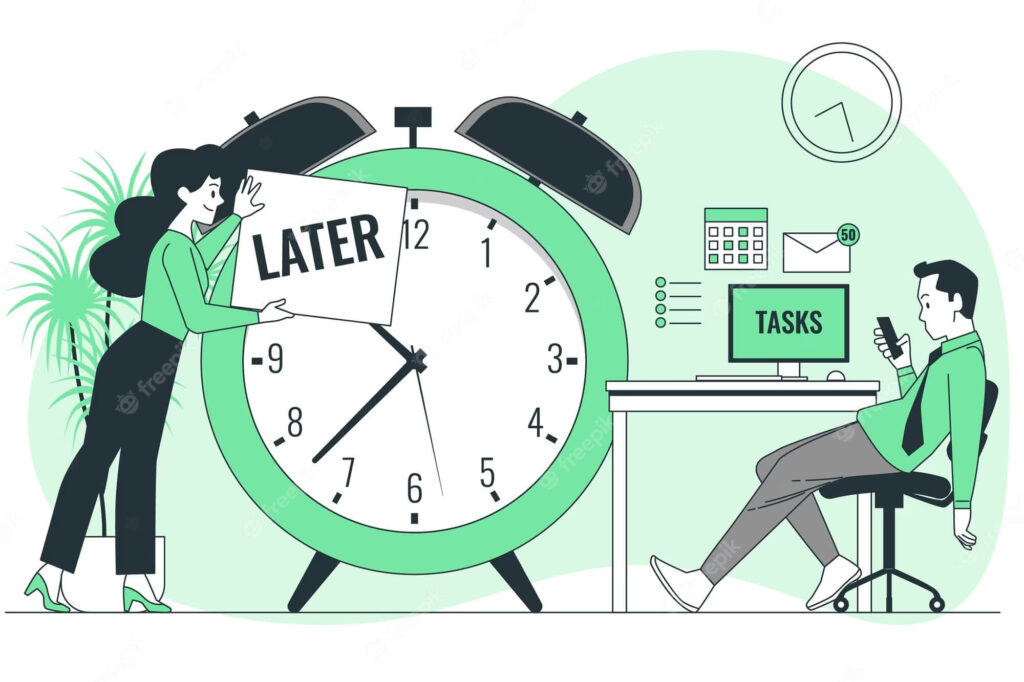
Introduction
Procrastination is something we all struggle with at some point. Whether it’s delaying an important work task, putting off studying for an exam, or avoiding household chores, procrastination can have serious effects on our mental well-being and productivity. Understanding why we procrastinate is the first step toward overcoming it. In this blog, we’ll explore the causes of procrastination, its impact, and actionable strategies to help you take control of your time.
Understanding Procrastination
Procrastination isn’t just laziness—it’s a complex behavior driven by psychological factors. It often stems from fear of failure, perfectionism, or feeling overwhelmed by tasks. Many people believe they work better under pressure, but in reality, delaying tasks often leads to increased stress and lower-quality work.
Identifying Your Procrastination Triggers
To tackle procrastination, you need to recognize what triggers it. Are you easily distracted by social media? Do you struggle with motivation because tasks feel too large? Identifying these patterns will help you take steps to minimize distractions and create an environment that supports productivity.
The Cost of Procrastination
Procrastination isn’t just an innocent habit—it can have real consequences. It affects mental health by increasing stress and anxiety, it can stall career progress, and it can put strain on personal relationships. The short-term relief of avoiding a task is often outweighed by long-term consequences such as missed opportunities and regret.
Practical Strategies to Overcome Procrastination
One of the most effective ways to combat procrastination is to start small. The 5-minute rule suggests committing to just five minutes of a task; once you start, you’re more likely to keep going. Time-blocking is another powerful technique where you set aside specific time slots for focused work. Prioritization methods like the Eisenhower Matrix or Pomodoro Technique can help you break tasks into manageable steps and stay on track.
Building a Productive Environment
Your surroundings play a crucial role in your ability to focus. A cluttered workspace can make you feel scattered, while an organized environment encourages productivity. Digital distractions are another major issue—consider using focus apps or website blockers to keep yourself on track.
Developing Self-Discipline and Motivation
Staying disciplined requires clear, achievable goals. Breaking tasks into smaller steps makes them feel more manageable. Rewarding yourself after completing a difficult task and having an accountability partner can also help keep you motivated.
Overcoming Mental Barriers
Many people procrastinate due to perfectionism or fear of failure. Instead of striving for perfection, aim for progress. A growth mindset—believing that you can improve through effort—can help you push past these barriers and get things done.
Creating Sustainable Habits
Long-term success isn’t about working harder; it’s about working smarter. Consistency is key when forming new habits. Developing a structured daily routine ensures that productivity becomes second nature rather than a struggle.
Technology and Tools to Stay on Track
There are many digital tools designed to help with productivity. Apps like Todoist and Trello can help with task management, while time-tracking apps like Toggl ensure that you stay accountable for how you spend your time. However, be mindful of digital procrastination—spending too much time organizing your work can be a form of avoidance itself!
Real-Life Success Stories
Many successful individuals have struggled with procrastination. By making small changes—like implementing time management techniques or reducing distractions—they have learned to be more productive. Learning from these real-life stories can inspire you to make changes in your own life.
When to Seek Professional Help
If procrastination is affecting your daily life to the point where it feels unmanageable, it may be a sign of underlying mental health issues such as anxiety or depression. Seeking help from a therapist or productivity coach can provide you with personalized strategies and support.
FAQs About Procrastination
- Why do I procrastinate even when I know it’s bad? Procrastination is often a habit formed by fear, perfectionism, or poor time management.
- How can I stop procrastinating immediately? Start with small steps—try the 5-minute rule or the Pomodoro Technique.
- Are there any quick hacks to beat procrastination? Yes! Use timeboxing, set deadlines, and remove distractions to boost focus.
Conclusion
Procrastination is a habit that can be overcome with the right strategies. By understanding its causes, recognizing triggers, and applying practical techniques, you can take control of your time and become more productive. The key is to start today—progress begins with a single step!


